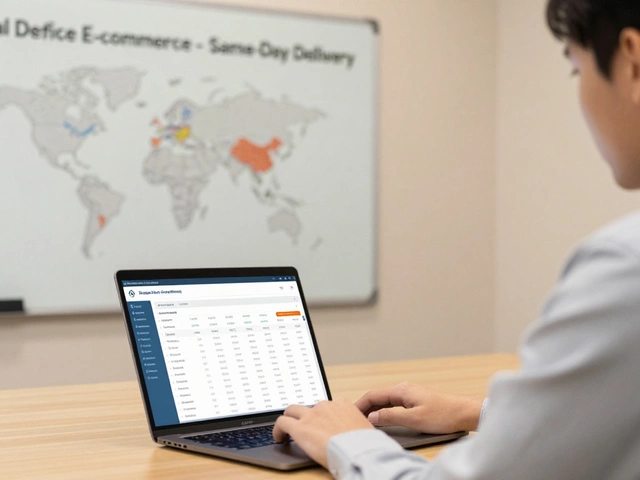Diving into international shipping can often feel like navigating an endless sea of options and price points. Among the ocean of choices, FedEx and UPS frequently stand out as two of the most trusted names, each offering comprehensive solutions for sending packages across the globe. Yet, choosing between the two can be challenging, especially when costs are a primary concern.
This article aims to peel back the layers of international shipping costs associated with both FedEx and UPS, providing you with a clearer understanding of which might be the better option for your needs. Whether you're a seasoned shipper or new to the task, understanding these companies' pricing structures will help you make a more informed decision.
- FedEx International Shipping Cost
- UPS International Shipping Pricing
- Factors Influencing Shipping Rates
- Tips for Cost-effective International Shipping
FedEx International Shipping Cost
When considering FedEx international shipping options, one has to navigate through a variety of services that cater to different needs and budgets. FedEx is a well-recognized leader in the logistics industry, offering numerous solutions for shipping packages overseas. The costs associated with these services largely depend on several factors, including the destination, package dimensions, delivery speed, and any additional features or services required, like tracking or insurance. FedEx is known for its express delivery service, which promises rapid, reliable shipping with stringent delivery timelines, albeit at a premium price. This makes it a preferred choice for businesses needing to send important documents or high-value items swiftly and securely.
The pricing model for FedEx's international shipping options can be categorized into express and economy, each serving different logistical needs. FedEx International Priority, for example, is an express service that offers delivery in one to three business days to over 220 countries and territories. It's suited for shipments that require prompt delivery, such as business contracts or emergency medical supplies. On the flip side, FedEx International Economy offers a more cost-effective solution with delivery in two to five business days, ideal for less time-sensitive shipments. Both options provide reliability and access to a global network, but express services incur higher fees due to the expedited nature of delivery.
According to a logistics expert quoted in Forbes, "The choice between FedEx's express and economy services ultimately hinges on a business's specific needs and the urgency of their shipments."
Shipping rates are also influenced by dimensional weight, an important concept in air freight where pricing is determined not just by actual weight but by the volumetric space the package occupies. FedEx uses this method to calculate costs for larger shipments that are light and bulky, ensuring that both space and weight are considered to optimize cargo capacity. An understanding of this pricing system is crucial for businesses managing international shipping budgets, as miscalculating dimensional weight can lead to unexpected surcharges.
Additional fees may apply for optional services. For example, FedEx offers enhanced tracking capabilities for shippers who require real-time updates about their package's location along its transit route. While this adds to the shipping cost, it provides peace of mind and transparency, making it a worthwhile investment for many businesses. The company's reputation for reliability is another major selling point, contributing to its status as a favored choice among international shippers. A recent customer satisfaction report highlighted FedEx’s high ratings for package handling and delivery reliability, attributes that often justify the higher price tag when compared to its competitors.

UPS International Shipping Pricing
When it comes to sending packages internationally, UPS offers a multitude of options tailored to fit a variety of needs and budgets. Their pricing model is comprehensive, factoring in dimensions, weight, destination, and the urgency of delivery required. For instance, UPS Worldwide Express® guarantees time-definite delivery by the next business day to most addresses in Canada or Mexico, and in two days to major business centers across the globe. Such express services come at a premium but assure fast and reliable delivery.
For those not pressed for time, UPS Worldwide Expedited® might be the more cost-effective option, promising delivery within two to five business days. This service balances speed and cost, appealing to customers who value efficiency without the need for maximum speed. It's important to note that UPS also provides door-to-door service and customs clearance, both of which are included in the shipping rate, streamlining the international shipping process for businesses and individual shippers alike.
One interesting fact about UPS international shipping is how they calculate dimensional weight: the theoretical weight calculated on the package dimensions rather than its actual weight. Dimensional weight is especially relevant for large yet light packages, often significantly affecting pricing in these cases. According to UPS, “Dimensional weight pricing applies to both domestic and international shipments, but is especially crucial for international where it can notably impact costs.”
Beyond basic services, UPS offers additional options such as UPS Worldwide Express Freight® for palletized freight shipments, perfect for larger, bulkier items. These services often come with specific tracking and additional security, which can be crucial for high-value shipments. Additionally, UPS My Choice® for business and personal shippers offers advantageous features like delivery date rescheduling and delivery alerts.
“Understanding the intricacies of international shipping with a giant like UPS begins with comprehending these pricing dynamics, which are essential for planning logistics” - Logistics Expert, Freight Analysis Journal.
For businesses frequently shipping internationally, UPS also provides business solutions that may offer lower rates through negotiated agreements, particularly beneficial for organizations shipping in volume. This allows companies to focus more on growth and less on logistical constraints. It's advisable for businesses to reach out directly to UPS representatives to explore which shipping contracts might best serve their needs.

Factors Influencing Shipping Rates
When considering the cost of international shipping with giants like FedEx and UPS, several nuanced factors come into play. First and foremost, the destination country significantly impacts the final price tag. Countries with a higher volume of trade relationships often benefit from established logistics routes, lowering the cost. However, shipping to a country with complex customs regulations or less frequent shipments can increase the price. Additionally, the weight and dimensions of the package are crucial, as these carriers use a combination of size and weight to calculate rates, often referred to as dimensional weight pricing.
The speed of delivery also greatly influences costs. Express services promising delivery within a few days substantially cost more than standard options that may take a week or longer. For businesses, the volume of shipments can affect rates since frequent shippers tend to receive discounted rates. It's worth noting that seasonal variations can cause fluctuations in rates too, as demand increases during the holiday seasons. Moreover, extra services like special handling, insurance, or delivery to remote locations can add to the shipping cost.
"Shipping rates are influenced by an intricate mix of volume, distance, package specifics, and market demands," states a logistics expert from the International Trade Administration.
Compliance with customs and import policies is another factor that cannot be overlooked. Duties, taxes, and other fees required by the government of the destination country can significantly add to shipping costs. The harmonized system codes (HS codes) used for international shipments can affect duties and taxes based on the product category. Some countries offer trade agreements that can reduce these additional charges, but staying informed on compliance requirements is critical.
Other Influential Factors
Besides these obvious factors, technological advancements are also playing a role in how shipping rates are determined. Many shipping companies, including FedEx and UPS, are investing in AI technology to better predict demands and optimize routes, potentially affecting rates in the process. Environmental factors, such as fuel prices, can quickly change shipping costs because carriers usually incorporate a surcharge to cover fuel costs. Lastly, geopolitical issues, such as tariffs and trade restrictions, can lead to abrupt changes in international shipping expenses. As these elements fluctuate, staying abreast of current events can help shippers anticipate and adjust to new costs effectively.

Tips for Cost-effective International Shipping
Shipping internationally doesn't have to break the bank. Whether you're sending a gift to family or conducting significant business transactions, understanding the nuances of international shipping can save both money and time. First and foremost, always compare rates between FedEx international shipping and UPS international costs for the specific route you're considering. These companies offer rate calculators online, allowing you to input package dimensions, weight, and destination to get a precise estimate. Embrace the habit of checking multiple options before settling on one. Sometimes, an adjustment as minor as altering the day of shipment can make a marked difference in pricing.
Moreover, consider consolidating shipments. By sending multiple packages together, you may be able to negotiate better rates, known as bulk discounts. Both FedEx and UPS often provide these price improvements for larger shipments. Planning shipments ahead of peak seasons or avoiding expedited shipping options, unless absolutely necessary, can further reduce costs. Additionally, understanding the customs implications of your shipment is crucial. Many unexpected fees come from misunderstood customs regulations, so take the time to acquaint yourself with the rules specific to your package's destination country. Proper documentation and correct usage of harmonized codes can prevent delays and additional charges.
Carefully packaging and labeling play a vital role in minimizing shipping expenses. Using the smallest possible box without compromising the safety of the package can lower dimensional weight charges. Both FedEx and UPS have standardized box sizes that might be used strategically to avoid surcharge fees. It’s worthwhile to invest in quality packaging materials to protect the contents, as damaged items can incur replacement and reshipping costs. Consider insuring your packages only when absolutely necessary, as high coverage plans can make a significant dent in your budget.
Shipping comparison and negotiation shouldn't be fear-inducing tasks. Did you know that shipping costs for standard international packages can vary dramatically based on the service level you choose? According to a study conducted by the Journal of Commerce, customers could save up to 25% simply by opting for slower shipping options that still meet deadline requirements. It's worth reaching out directly to sales representatives for potentially lower rates especially if you are shipping regularly. Remember, both FedEx and UPS value repeat customers and might offer undisclosed loyalty rates or special promotions to secure your business.
Moreover, using third-party shipping consolidators can sometimes yield discounts over going directly through FedEx or UPS. These services often aggregate shipments from multiple clients to negotiate lower rates that might not be available to individuals. However, it’s crucial to ensure these consolidators have good reputations and reliable customer service. Customer reviews and testimonials can provide reassurance when venturing down this path. Ultimately, knowledge is power, and knowing the insides of the international shipping rates game can save you a substantial amount over time.





